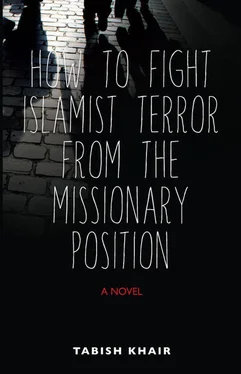Once I ribbed him about it. I did not understand his interest in such sessions.
“You underestimate them, bastard,” he replied. “They are far more pertinent and political than almost all the academic seminars that I have attended. They discuss matters of significance and do it honestly: how to make sense of the world, how to make it a better world. They still have a conscience, these young men and women, not just a bank account like the rest of these people.”
He waved his hand at the young people drinking and dancing in the Irish pub we were in.
“I know all about the politics,” I retorted. “I grew up with politics beating down on me. Basically, it all boils down to three points: the Quran is the final hand-autographed word of God; the West is fucking us; the Jews are fucking us via the West.”
“You know, bastard, that I would not let that kind of racism go unchallenged. Actually, while they are probably very anti-Israel, they do not really discuss the matter much.”
“Yes, because you are there.”
“Listen to yourself, yaar. You sound like a Danish tabloid. What do you think they are? The secret Århus cell of Al Qaeda?”
“Who knows?”
“Karim Bhai, a terrorist! Really, have you ever come across a person with more seriousness of purpose, more consideration for other people’s space, you fanatic? He lets us drink in his flat, and you know what alcohol means to people like him.”
“Perhaps he needs the money more than he hates alcohol.”
“Oh yes, perhaps he is the main funder of Al Qaeda? That’s why he needs the money so badly!”
“Who knows? He works all the time; he disappears suddenly; he gets strange phone calls; you cannot deny he needs the money for some reason.”
“The same reason as all immigrants except fucking privileged ones like us. He probably sends money home to his family. You know, bastard, you have been in the West too long; go back home. You need a shot of sanity.”
“Sanity was banned in Pakistan by Zia, bastard,” I replied. “And that is one ban no one is going to lift.”
But Ravi was right. I was arguing just to irk him. I did not really suspect Karim of being a radical Islamist, let alone a terrorist. Not yet.
I think it was soon after this conversation that Ravi started growing a beard: a stylish, French-cut beard, but still. “Don’t tell me Karim Bhai has converted you,” I remarked to him. “It is an experiment, bastard,” he replied mysteriously.
Karim’s days were patterned. He worked as many shifts as he could. It was Friday afternoons and evenings that he kept free: for his weekly trip to the mosque, which was a room in a private house, and for his Quranic sessions. When he was not working, he was usually home, reading some commentary on the Quran, praying, telling his blue-speckled-with-black beads or watching TV in his room. He would tidy up regularly, even offering to tidy up in our rooms if we were around. Cleanliness was a mantra with him. He was not too orderly, though, leaving things lying about as long as they were not dirty.
Once in a while, his routine existence would be disturbed by a phone call. Looking back, when suspicion gripped me towards the end of our stay in Karim’s flat, I identified two kinds of phone calls. Most of them were the normal kind: Karim would pick up the phone and talk into the receiver, in Danish, English or Urdu, about various mundane matters. If one of us picked up the phone, there would be a voice at the other end identifying himself or (very rarely) herself and asking for Karim. Then there were the usual wrong numbers. Perhaps too many, I suspected later on, though some of them—like the woman who called asking, in slurred Danish, to be connected to her “mand,” or the child who dialed incorrectly—seemed innocuous enough.
But the second kind of phone call was different and much rarer. So rare that we paid it sufficient attention only in retrospect, when suspicion left us with no choice. The phone would ring. If Ravi or I picked it up, sometimes it would go dead. It would ring again, and usually Karim Bhai would pick it up with alacrity if he was in the flat. If he wasn’t, it might go dead again and not ring for the next six hours, which was the usual duration of Karim Bhai’s shifts. When Karim Bhai picked up the phone, his conversation was restrained, seldom going beyond yes or no. Once I heard him say in Danish, in a tone of irritation, “Why do you always forget to call me on my mobile?” Though he was immediately contrite after that. He started apologizing, but then the phone went dead. A few seconds later Karim Bhai got a call on his mobile, which he answered in his room after, unusually, closing the door.
All this went unremarked by me then, as did the young men and (fewer) women who came to Karim Bhai’s Friday sessions. Later, when I mentioned these calls to the police, the interrogating officer looked visibly pleased. He was less pleased by my inability to give him a full description of most of the young men and women. But, like the phone calls, I had not noticed them then. If I had noticed them, I had noticed the resemblance between them: beards and veils.
On faces of different colors—mostly South Asian, occasionally European, African, or Indonesian- or Malaysian-looking—but framed by the same seriousness of purpose, the same solemnity, the same sparse or full growth of hair on their chins, the same wrap of cloth around their head… I could not have described them if I had wanted to. The only one I could have described was Ali. Or Ajsa. But of course, the police knew all about Ali and Ajsa by then. And, to be honest, Ajsa, as far as Ravi and I could recall, had attended only one of the sessions.
It had been a morning in March. I am certain about that because, after relenting in February, the cold had returned with a vengeance so that, when the bell rang and I opened the door, the chill cut me to the bone, although the flat was on the third floor. Standing outside, all wrapped up, with just some wisps of her blonde hair showing, was a young woman. For a moment I thought she was one of Ravi’s new girlfriends, but she was by no means “plain,” even by Ravi’s standards. A tall, willowy woman, blue-eyed, blonde, almost my height: she was evidently Danish. I was surprised when she asked for Karim Bhai. She called him “bhai” too, which was just as surprising.
As Karim had been on a night shift and was expected to return any moment, and as we were going to have breakfast in the kitchen, I asked her to join us. She did, though just for a coffee. When I introduced her to Ravi, she looked unsurprised—both by his looks, which seldom went unnoticed, and by his presence.
“It is good to meet both of you,” she said. “Karim Bhai was so happy when you rented the rooms after Babo and Mama vacated in such a huff. He was uncertain he would be able to rent out the rooms again, at least not both of them. You know how Danes are.”
It was then that we understood who she was. She was not Danish. She was the young Bosnian woman whose elopement with a religious Somali man had cost Karim Bhai his previous tenants. She introduced herself as Ajsa and kept out of our conversation, absentmindedly sipping from the mug that I had handed her. I could now see that she had a smart veil wrapped around her blonde hair. It was there for propriety, not to keep out the cold.
She spoke a bit more when Karim Bhai came in and joined us for breakfast. It was mostly about her husband. Much of it was too cryptic for me to follow, but I could sense that she was worried about the Somali. His name, I gathered, was Ibrahim. I remember that towards the end of the conversation, she said:
“You know how Ibrahim feels about the cartoons. You know how he is.”
At this, Karim Bhai said to her, glancing surreptitiously at us, “Perhaps we can talk about it some other time. I will call on both of you.”
Читать дальше












